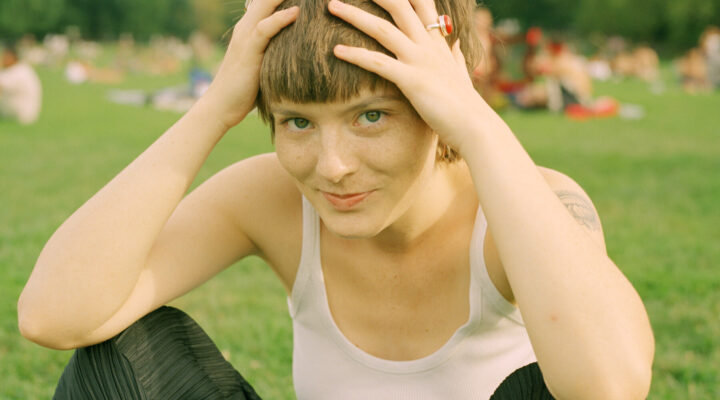New Radicalism
Interview by Susanna Li
Photos by Hanane El Ouardani, Ali Al Shehabi & Mous Lamrabat
Ever so pertinent in a fast-paced era dependent on visual identity, New Radicalism aesthetically recontextualises Edward Saïd’s Orientalism for the here and now. Through the “seductive power of design” the festival draws from within the countercultures of the MENA to reach outside of it. Amidst a swirl of festivals that all promise to tinker with boundaries and barriers, (A)WAKE new initiative gives an appropriately plural, contemporary account of the Middle East and North African (MENA) diaspora in a weekend filled with music and art as well as lectures, panels and workshops. We have our eyes on the club night on Friday and the In-between music and movement panel on Saturday. We shot the creators, Shirin and Narges, a couple of questions ahead of the festival.
Is there a personal story behind what drove you to create New Radicalism? An event, an accumulation of events?
Recently, ‘diversification’ of mainstream cultural programmes have become very in vogue. This seems good, because young creatives who were previously overlooked are being given a voice, but this pluralism is often superficial. Instead of providing a nourishing, grounded platform that gives space for open dialogue and honest collaborations, this type of diversity tokenises and ‘others’. We found that most artists from the MENA region living or working in the West are nostalgic about their home countries but situationally confined to Western representations and valorisation frameworks. To counter this, we hope to reach and reflect the hard-to-grasp spaces between this dichotomy, where definitions are not yet hierarchically imposed. We made New Radicalism to give young creatives who feel they are in a cultural limbo the strength, insights and tools for awareness of the implicit power structures cloaking the cultural world. First and foremost a platform for collaboration and interaction based on mutual interests and a dialogue born from trust.
“Be bold, but be smart.”
I really liked how the festival emphasises being ‘by and for’ the MENA diaspora in the horizontal curating structure. Does the audience participate in the making/situating processes of the festival?
The horizontal curation format isn’t explicit to the festival attendee, but we primarily wanted to bring the position of single curator (in charge of creating meaning in cultural translation) closer to the visitor. Saïd’s ideas of the contrapuntal and polyphony stress two or more simultaneous lines of independent voices and melodies that, given equal weight, provide intimate harmony. So we immerse the visitor in different debates, topics, narratives and personal stories on identity and displacement. It can be overwhelming, but the programming with multiple mediums intentionally uses multiple forms to build an accommodating artistic and intellectual platform.
In creating a platform for and with a specific group in mind, how do you make it both exclusive and inclusive?
We’ve taken into account the different audiences that will visit our festival, especially in the national context. In terms of an audience that might not particularly have a strong connection to the MENA region, we hope to give insights on the consequences of orientalising other cultures and provide alternative cultural narratives by showcasing up and coming artists from the region. We appeal to all who have an interest in innovation and progressive art and hope to foster an openness for the areas which are underrepresented.
“Don’t underestimate the power of collaborating with people that share similar visions, ideas or skin colour.”
What would you say to other marginalised groups, diasporas who want to create a platform for themselves?
Be bold, but be smart. Loud words matter when said on an important moment to the people that truly desire to listen and want to create a change. Don’t underestimate the power of collaborating with people that share similar visions, ideas or skin colour. It impacts how you work, the empowerment you will feel and it will even strengthen your own feeling of mattering. With New Radicalism, we’ve worked with people that share not only similar values in life, but also a similar skin tone, personal histories and cultural influences, and we feel more than honoured.
Along with the 3-day weekend tickets (€60,00 and €50,00 for students), New Radicalism has day-tickets (€30,00 regular and €25,00 for students) that provide full access to the program for that day, meaning panels, talks, lectures, workshops, exhibitions and the music program.
Friday from 21.00 – 04.00 (Ta-Ra (live), OJOO GYAL, Mechatok, Sarra Wild, Roojez) – €10,00
Saturday from 21.00 – 04.00 (Mien San, Noor Palette, DJ Dziri, Guedra Guedra كدرة كدرة (live), Cheb Runner) – €10,00
Sunday from 19.00 – 01.00 (Fatima Ferrari, Retro Cassetta (live), Disco Arabesquo) – €5,00
Feeling a bit overwhelmed by all that’s on offer? Here are some events we have on our must-attend list:
Friday: Club Night – Mechatok, OJOO GYAL, Sarra Wild & Ta-Ra
Saturday: A Zine workshop with Azeema Magazine
Saturday: In Between Music and Movement
Sunday: In-Between linear history and all other histories







